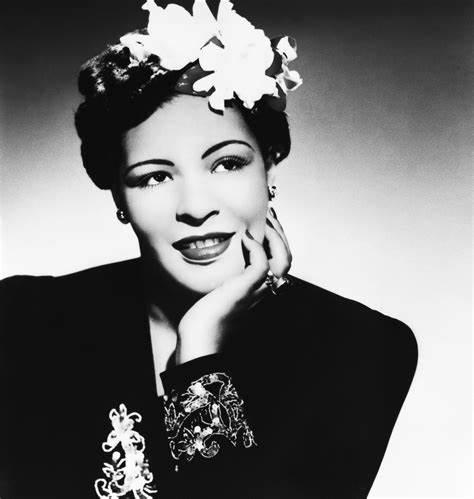WOMEN IN HISTORY - BILLIE HOLIDAY
African American Jazz singer/songwriter – “Lady Day”
DATE OF BIRTHApril 7, 1915
|
PLACE OF BIRTH
Philadelphia
|
DATE OF DEATH
July 17, 1959
|
PLACE OF DEATH
New York City
|
BACKGROUND
African American Jazz singer/songwriter nicknamed Lady Day by her fellow musicians, known for her intimate style, innovative phrasing, and strong personality. Some scholars credit her for sparking the Civil Rights Movement by choosing to record and perform the poignant anti-lynching song, “Strange Fruit.”
She adopted the name Billie Holiday after her favorite film star Billie Dove and used her father’s name Holiday (later changed from Haliday) when she landed her first singing job. Her professional recording career began at age 18 when she was discovered by producer, John Hammond. She went on to record with many record labels and worked with jazz greats including Benny Goodman, Teddy Wilson and Artie Shaw.
Born Eleanor Fegan to teen parents Clarence Holiday and Sadie Fagan, she began working at a very early age to help support the family after her father left. While her mother struggled to find work, Eleanor was raised for a time by other family members, then returned to her mother, whom she later supported during her recording days.
She adopted the name Billie Holiday after her favorite film star Billie Dove and used her father’s name Holiday (later changed from Haliday) when she landed her first singing job. Her professional recording career began at age 18 when she was discovered by producer, John Hammond. She went on to record with many record labels and worked with jazz greats including Benny Goodman, Teddy Wilson and Artie Shaw.
Born Eleanor Fegan to teen parents Clarence Holiday and Sadie Fagan, she began working at a very early age to help support the family after her father left. While her mother struggled to find work, Eleanor was raised for a time by other family members, then returned to her mother, whom she later supported during her recording days.
EDUCATION
Due to constant moving, and a need to help earn money for the household, Billie began skipping school, and at 9 years old, spent time in a home for girls for truancy, but she learned about life primarily on the streets of Harlem. Her earliest musical influences were Louis Armstrong and Bessie Smith, from whom she adapted her improvisational style, never singing a song the same way twice.
ACCOMPLISHMENTS
Billie was one of the first Black women to sing with an all-white orchestra (Artie Shaw), appeared in a movie, “New Orleans” in 1947, also starring her idol, Louis Armstrong and was one of the first female singers to command over $1,000 per week. She published her autobiography, “Lady Sings the Blues” in 1956.
She was posthumously inducted into the Rock and Roll Hall of Fame in 2000. Two movies, to date, have been produced about her life, “Lady Sings the Blues” starring Diana Ross in 1972, and “The United States vs Billie Holiday” in 2021 starring Andra Day.
Billie’s legacy will continue to be her incredible voice, and determination to share her music, despite her tumultuous life of alcoholism, drug addiction and abuse.
She was posthumously inducted into the Rock and Roll Hall of Fame in 2000. Two movies, to date, have been produced about her life, “Lady Sings the Blues” starring Diana Ross in 1972, and “The United States vs Billie Holiday” in 2021 starring Andra Day.
Billie’s legacy will continue to be her incredible voice, and determination to share her music, despite her tumultuous life of alcoholism, drug addiction and abuse.
CITATION
This page may be cited as:
Women in History. Billie Holiday biography. Last Updated: 11/12/2023. Women In History Ohio.
<http://www.womeninhistoryohio.com/billie-holiday.html>
Women in History. Billie Holiday biography. Last Updated: 11/12/2023. Women In History Ohio.
<http://www.womeninhistoryohio.com/billie-holiday.html>

